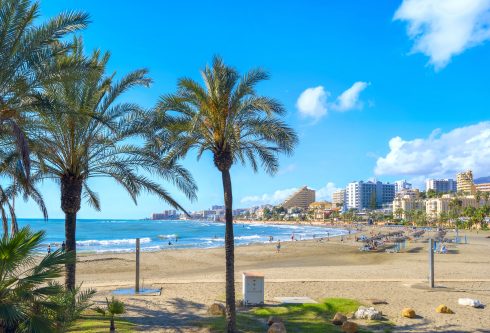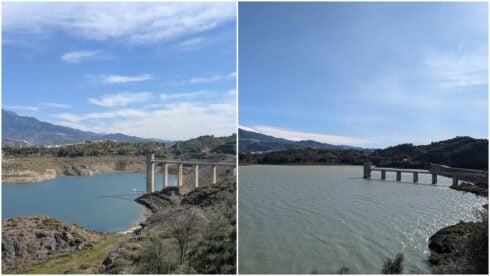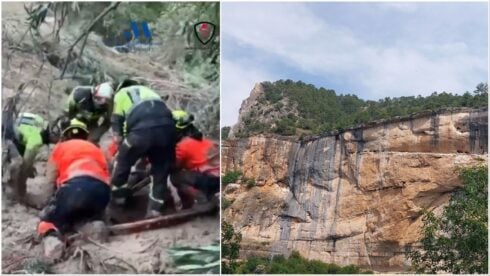LOOKING out across the rolling plains of the Cordoba Campina, my teenage son felt just like Olenna Tyrell surveying her kingdom.
His perch on a balcony near the top of a tower at Almodovar del Rio castle had become part of one of the seminal scenes of Game of Thrones’ series seven.

This vertigo-swirling spot at mythical Highgarden castle is where the ancient queen of the Reach empire looks out to see the giant army of the Lannisters amassing far below.
Within hours her redoubt is stormed and Olenna is forced to imbibe poison in a moment now etched in celluloid history.
One of many parts of this imposing Moorish castle that can be visited today (with over a dozen stills from the hit HBO series conveniently dotted around), in the words of my son this is ‘how castles should be restored’.

A formidable spot over a bend in Andalucia’s Guadalquivir river, half way along the ancient Roman road between Sevilla and Cordoba, the 8th century fortress had indeed been carefully renovated to the tune of millions by the former Count of Torralva back in the early 20th century.
Some 800 workmen spent 36 years turning it into a home, with dozens of bedrooms, alongside obligatory banquet halls and ballrooms, as well as keeping its most interesting features, including a huge courtyard and dungeon.

Impressive in both scale and location, little-visited Almodovar castle is a great way to spend a couple of hours either side of a splendid lunch at La Taberna Cuatro Caminos, a short five-minute stroll downhill.
Part of a long-weekend history tour, geared around Game of Thrones, but equally appealing to my wife, who appreciated the scenery and architecture of the fascinating Campina region, the real joy however, is the lack of tourists.
For this area of rich extensive area of farmland between the two key Andalucian cities has three or four towns of incredible touristic interest all well worth a visit.
I’ve long extolled the delights of the little-known gems of Ecija and Carmona (allegedly Spain’s oldest settlement) for anyone who’s done Sevilla and Cordoba, or equally Granada, Malaga and Ronda to death.
But how about Osuna or Medina Azahara? All gems of the former Roman and later Moorish dynasties that ruled the region for well over ten centuries.
Our tour began around 10 miles north of Sevilla at the ancient city of Italica, where two scenes from Game of Thrones were filmed.

This Roman town that has been slowly unravelling itself to archaeologists for the last century, is replete with a number of villas and a spectacular coliseum, where a zombie, known as ‘the Whitewalker’ is put to death in the programme.
An enormous site crisscrossed with ancient paved streets and dotted with monuments, the tragedy is how much of the former city was carted away in the 18th century to build the main road north into Extremadura and even a dam on the River Guadalquivir.
It’s still an impressive place to visit (the birthplace of emperors Trajan and Hadrian) and a real surprise for first time visitors, with many a Spanish bride and groom getting their official wedding pictures here.
Founded in 206BC, it was built on a classic Roman grid plan with public buildings and a forum at the centre and was linked to a busy port on the nearby Guadalquivir. Thanks to Hadrian who built a number of temples and made it an official ‘colonia’ it thrived for hundreds of years until the 3rd century, when the river silted up, encouraging the growth of nearby Sevilla.

Thankfully the vast majority of tourists visiting nearby Sevilla do not venture out, meaning you will often have the place to yourselves.
From here we struck out east towards Osuna, where we stayed for the night, thanks to its healthy choice of former palaces to bed down in.
A strategic place which once stood on the edge of the former Kingdom of Granada and the hilly Cordilleras Beticas where the Moors clung on for two centuries until 1492, it was first inhabited by the Tartessians 3000 years ago.
Becoming a Roman colony called Genetiva Iulia, when Julius Caesar visited, it later became known as Oxuna in Moorish times until it was taken by the Catholic kings in 1239 after a bloody battle.

Changing the name to Osuna, it was during the 15th and 16th centuries that it really flourished when Count of Urena encouraged the construction of 13 churches, a convent, hospital and even university (still open with a splendid Mudejar ceiling).
It was clearly a wealthy place, with one street, in particular, decreed by UNESCO to house the most impressive collection of palaces in Spain.
Calle San Pedro (but equally a handful of parallel and perpendicular streets) is full of veritable gems from the Baroque to the Renaissance periods and, including, at least one hotel, Palacio Marques de la Gomera, which must be visited for its charming courtyard and chapel.

We stayed at its sister hotel at the top of the town, the Hospederia del Monasterio, and got up early and had a fascinating walk up to the so-called Canteras area, a plateau full of ancient burial sites and caves, from where much of the golden sandstone was hewn to build the town’s wonderful churches and palaces.

The views across the Campina stretched forever, while the atmospheric photos of the town catching the early-morning sunshine were worth the stroll alone.

We got back and woke up the teenager to head for breakfast and then the highlight, the bullring, where the HBO cast and crew had spent 17 days filming a major gladiator-style Dragon scene from season five.
The night before we’d stumbled across the very restaurant, Casa Curro, where actress Emilia Clarke had celebrated her birthday, with appropriately, dozens of photos from the night on the wall.

The staff proudly showed off a signed visitor book, while I tried to recall what I’d eaten here some 10 years earlier. Nothing exciting, in truth, but probably (still) about the best of what’s on offer in Osuna.
Rocking up around midday, what we hadn’t realised was the bullring was shut, it being a bank holiday close to Christmas, so all we could do was walk around it from the outside and peer through the odd gap. (NB. It’s only open from Friday afternoon to Sunday).
The laddie took it surprisingly well however, maybe thanks to spoiling him with a giant plate of pancakes for breakfast, and the Almodovar castle more than made up for it later that afternoon.
By nightfall we were back on the Costa Del Sol, but not before a splendid late lunch at a new grill restaurant Asador La Perdida, in Alcala de Guadaira, just south of Sevilla.
A splendid stop just off the motorway, in its own this is the perfect stop off for anyone en route to Sevilla. One to remember.
WHERE TO EAT AND STAY
Hotel Hospederia de Monasterio (www.hospederiadelmonasterio.com), in Osuna, sits in a commanding position at the top of the town, with a wonderful courtyard with its own splash pool and sunbeds. While the rooms are charming, it’s a little too sleepy in winter, there is no-one on reception and you have to head out to get your breakfast.
Restaurante Casa Curro in Osuna is where the cast and crew of Game of Thrones frequently ate and celebrated the birthday party of Emilia Clarke. It claims to have the biggest selection of tapas in the town and you can eat in both the dining room or bar, where the walls are covered with the many celebrities and bullfighters who have visited over the years.
La Taberna Cuatro Caminos (www.latabernadecuatrocaminos.com) in Almodovar del Rio is a true dining secret serving up perhaps the best Rabo de Toro in Spain (oxtail originated in Cordoba). A professional place run by Juan Sanchez Doblare since the 1970s, his wife Antonia is the cook. Also famed for its croquettes, make sure to order a snifter of the bone dry Montilla Moriles fino on offer.
Asador La Perdida, in Alcala de Guadaira (www.asadorlaperdida.com) is a charming country home set in its own grounds, easy to park and with a very distinct style. Just five minutes off the AP-4 motorway, you sit outside in the gardens or patio, or inside in one of three stylish dining rooms. A grill-style joint, the steaks are fabulous, although there are loads of salads and specials of the day.
READ MORE:
- Ten reasons to visit Spain’s green and glorious Galicia this summer
- FROM CASTLES TO CABINS: Here are the coolest staycation properties in Spain
- Five lesser known towns worth a visit on Spain’s Costa del Sol this summer
Click here to read more Olive Press Travel News from The Olive Press.








